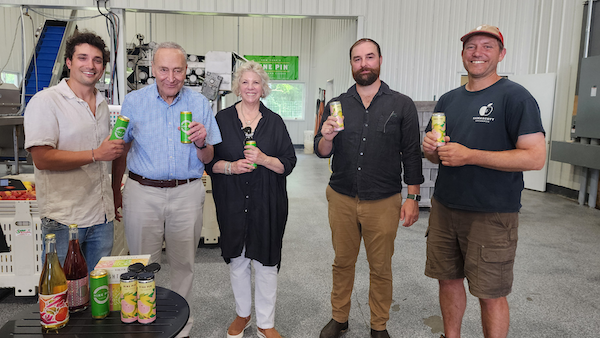New York’s Senator Schumer to Champion the Bubble Tax Modernization Act

The American Cider Association is pleased to share that U.S. Senate Majority Leader Charles E. Schumer will be championing the Bubble Tax Modernization Act in the Senate. While standing at New York’s Samascott Orchards, a provider of apples to New York’s Nine Pin Cider, Senator Schumer emphasized his commitment to close the carbonation barrier that is continuing to hold back innovation in the cider industry.
“There is no reason that craft cidermakers like Albany’s Nine Pin should get hit with a whopping 1,400% tax increase if they want to make bubblier cider or cider that is mixed with other fruits which has soared in popularity. It hurts our craft cidermakers, hurts consumers, hurts our growers, and is slowing the growth of this booming industry in Upstate NY,” said Senator Schumer. “That is why I am proud to support the Bubble Tax Modernization Act to finally pop this convoluted carbonation tax hamstringing the craft cider industry.”
Senator Schumer has long been a supporter of the cider industry and was instrumental in the passage of the CIDER Act in 2016. The CIDER Act successfully lowered taxes and increased the allowable carbonation threshold on hard cider made from apples and pears. The Bubble Tax Modernization Act seeks to achieve a similar result for ciders fermented or flavored with fruits other than apples and pears.
In a state like New York where diversified farms are plentiful, putting a carbonation cap on fruit ciders limits opportunities for collaboration, innovation, and success with consumers for both growers and cidermakers. Products like Nine Pin’s blueberry cider, made with a blend of apples from Samascott Orchards and blueberries from Indian Ladder Farm, are a prime example of profit extension for farms through year-round value-added agriculture.
Additionally, extreme weather events can create gaps in apple harvest, making co-fermentation or blending with other desirable fruits necessary in certain harvest years. “Flexibility in fruit is important for growers,” says Michelle McGrath, CEO of the American Cider Association. “We’ve seen an uptick in co-ferments and fruit blends driven by consumer interest, but also driven by necessity. If your harvest was demolished by a freeze or a heat dome, why wouldn’t you consider blending with other fruit that had a better harvest? The bubble tax makes it harder to pivot when needed,” McGrath continued.
To put the current tax structure in content, 100 gallons of hard apple or pear cider costs $22 in federal taxes. However, if cidermakers make a co-fermented batch of cider with blackberries and carbonate it like other products, they will have to pay $340 in federal taxes. The Bubble Tax Modernization Act would allow fruit ciders to carbonate to the levels that hard apple and pear ciders are allowed. This change would allow cidermakers to give consumers the fruitier bubblier cider they want at a price they can afford.
The Bubble Tax Modernization and Tax Reform Act, which only applies to products under 8.5% alcohol by volume, would also open fruit mead and fruit wine up to more carbonation. Like cider, mead and winemakers with products under 8.5% ABV can carbonate at a higher threshold–until fruit is involved. In today’s beverage landscape, many producers are making cider, mead and wine. The lack of carbonation is a competitive disadvantage for these producers. The bill was introduced in January 2024 with bipartisan support on the house side through Congressman Earl Blumenauer (OR) and Congressman Mike Kelly (PA).
“We’re thrilled about Senator Schumer’s enthusiastic support of the Bubble Bill. He’s a champion for New York’s agricultural community and he gets that the community includes cider,” McGrath said.
To learn more about the current bubble tax, download our Bubble Tax Fact Sheet.
